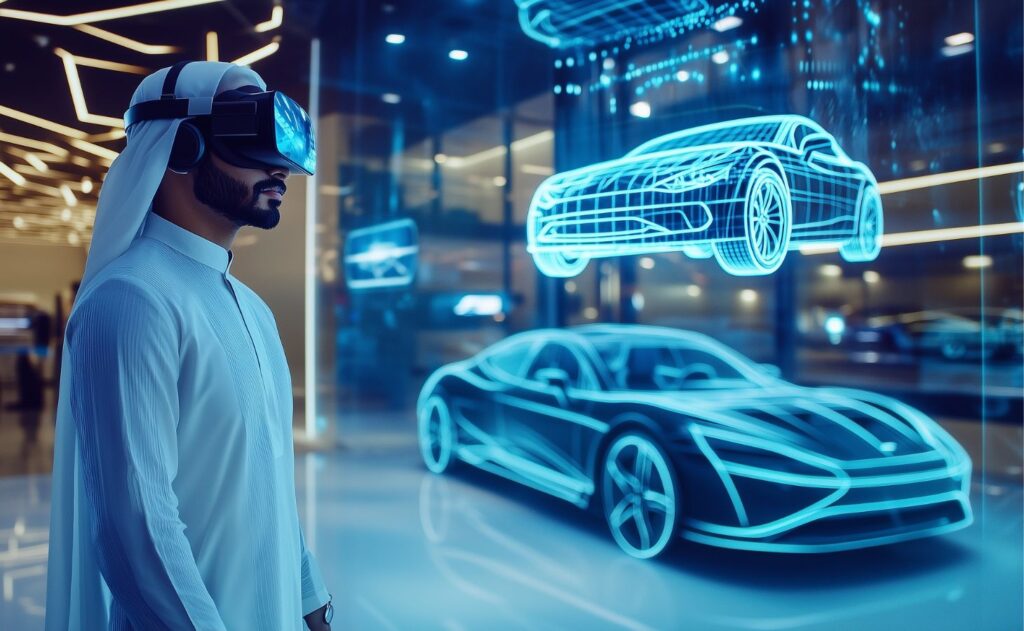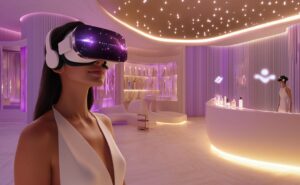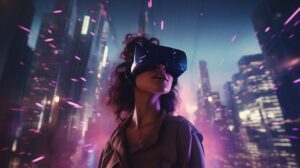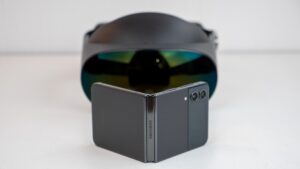The luxury automotive industry is entering a new era—one defined not just by engineering excellence, but by intelligent digital experiences. Technologies like Artificial Intelligence (AI) and Extended Reality (XR)—which includes Virtual Reality (VR) and Augmented Reality (AR)—are reshaping how customers interact with luxury car brands. From AI-powered personalization to immersive virtual showrooms, these innovations are revolutionizing customer experience, training, and marketing strategies while preserving the craftsmanship that defines luxury.
How AI in Luxury Cars Elevates Customer Experience
The role of Artificial Intelligence in the luxury automotive industry is to create a seamless, personalized, and memorable journey for customers. AI integrates predictive analytics, natural language processing, and machine learning into every stage of the customer journey.
1. Personalized Experiences
Luxury brands now analyze purchase history, driving behavior, and personal preferences using AI. This allows them to suggest car models, accessories, or upgrades that feel uniquely designed for each customer. According to a Salesforce survey, 70 % of car owners say they would use an AI agent if it could diagnose and address car issues in real time.
Use Case: Bentley partnered with YORD to create an Apple Vision Pro luxury car configurator and immersive test drive. This AI-powered experience allows customers to explore vehicle options, customize features, and virtually test drive models from anywhere, enhancing personalization and engagement.
2. AI-powered assistants
Brands like Skoda, BMW and Mercedes-Benz are adopting intelligent assistants that guide customers during the purchase process and continue to add value long after the sale. In fact, a survey shows 61 % of car owners want AI agents to recommend the best car for their needs, and 63 % expect route optimization tailored to them.
Use Case: Škoda partnered with YORD to recreate its co-founder Václav Laurin as a hyper-realistic MetaHuman powered by AI. Designed for the Škoda Museum, this digital avatar engages visitors through interactive storytelling and personalized dialogue, blending brand heritage with cutting-edge innovation. The experience was later showcased at Milan Design Week 2025, highlighting how AI-driven personas can elevate customer engagement.
3. Customer service redefined
AI chatbots and avatars can interact with customers 24/7, providing assistance across channels such as web chat, mobile apps, and even Augmented Reality interfaces. The AI for customer service market was valued at USD 13 billion in 2024, and is forecasted to reach USD 83.85 billion by 2033.
Use Case 1: Toyota developed the eCare Bot, an AI-driven assistant that proactively monitors vehicle data and contacts drivers when issues arise. It explains the problem in natural language and suggests immediate next steps, from quick fixes to scheduling service.
Use Case 2: YORD Studio developed Metaverses & Virtual Environments for Automotive, an immersive VR-commerce ecosystem that integrates AI-powered chat and voice assistants to guide users through virtual showrooms. Customers can interact with digital avatars, ask questions, explore features, and even complete purchases—all within a fully interactive 3D environment accessible via web, mobile, or VR headsets.
Virtual Showrooms and Augmented Reality Experiences
In an industry built on exclusivity and elegance, Extended Reality has become a powerful tool for customer engagement. Virtual Reality (VR) and Augmented Reality (AR) are creating new ways for customers to interact with vehicles without stepping into a traditional dealership.
1. Automotive Virtual Showrooms
Through VR, customers can explore interiors, exteriors, and features in photorealistic detail. These environments replicate the showroom experience, allowing test drives and configurations to take place from the comfort of home. For brands, this reduces geographic limitations while increasing accessibility.
Use Case: Škoda Auto launched the Škodaverse Spatial – Elroq Campaign, a 3D virtual showroom that immerses users in the brand’s latest innovations. The interactive environment features gamified content, product exploration, and seamless integration with metaverse platforms like Roblox and Nemesis.
2. Augmented Reality in Automotive Industry
AR apps are revolutionizing how buyers experience vehicles in physical showrooms. By pointing their devices at a car, customers can instantly view specifications, try color variations, or even test accessories virtually. This interactive process not only aids decision-making but also strengthens brand connection.
Use Case: Bentley’s virtual AR launch lets users explore cars and brand heritage interactively, increasing engagement and creating memorable immersive campaigns.
Comparison: Traditional vs. Virtual Showrooms
| Aspect | Traditional Showroom | Virtual Showroom (XR) |
|---|---|---|
| Accessibility | Limited to physical location and opening hours | Available globally, 24/7 from any device |
| Experience | Real-world vehicle test drives and physical view | Immersive VR test drives with interactive, photorealistic models |
| Costs | High expenses for premium spaces and staff | More cost-efficient, scalable, and less dependent on location |
| Personalization | Relies on salesperson expertise | AI-driven recommendations and real-time customization |
AI and XR Marketing Innovations for Luxury Automotive
Luxury car marketing has always been about storytelling and aspiration. With AI and XR marketing, brands are now able to create immersive marketing strategies that combine tradition with innovation.
1. AR Experiences
AR apps are revolutionizing how buyers experience vehicles in physical showrooms. By pointing their devices at a car, customers can instantly view specifications, try color variations, or even test accessories virtually. This interactive process not only aids decision-making but also strengthens brand connection.
Use Case: Škoda Auto collaborated with YORD Studio to develop an interactive 3D configurator and AR visualizer for the Enyaq RS and Enyaq RS Coupé. This app-free experience allows users to personalize models in real time—adjusting colors, trims, and features—and then project them into their own surroundings using AR.
2. Immersive campaigns
Through Virtual Reality launches or AR filters on social media, automotive brands invite customers to participate in interactive experiences. This creates deeper emotional bonds by letting users explore brand heritage while visualizing the future.
Use Case: BMW launched M Mixed Reality, a VR experience where the virtual and physical worlds merge, allowing users to feel the feedback of vehicles like the BMW M4 Competition Coupé while navigating breathtaking virtual racing scenes—even on Mars. This increased customer engagement and offered a memorable, fully immersive experience.
3. AI-driven targeting
- Predictive analytics powered by AI helps luxury automakers craft marketing campaigns that resonate with specific segments. Instead of generic promotions, customers receive personalized content that aligns with their values, lifestyle, and aspirations.
Use Case: NVIDIA partnered with automotive brands to deploy Generative AI In-Vehicle Experiences, providing avatars that alert drivers to obstacles, interpret signs, manage HOV lane fees, offer multiple camera perspectives, and communicate in multiple languages with domain-specific knowledge.
4. Interactive Museums
- Using XR, brands digitally replicate iconic models or historical campaigns. Customers can step into a virtual gallery to explore a brand’s evolution—bridging craftsmanship with cutting-edge storytelling.
Use Case: Czech manufacturer TATRA collaborated with YORD Studio to create the AR Museum, an augmented reality exhibition that brings the brand’s rich history to life. Visitors can use tablets or smartphones to view historical images, 2D and 3D animations, and archival materials that complement the physical exhibits.
5. VR Simulation
- Allows automotive brands to simulate realistic environments for training, product testing, and customer interaction. These simulations provide hands-on experiences that replicate driving conditions, dealership visits, or product showcases—helping brands reduce costs while offering immersive, data-driven engagement.
Use Case: YORD Studio developed Metaverses & Virtual Environments for Automotive, a VR-commerce platform that enables brands to present collections and engage customers in fully immersive virtual showrooms. Accessible across web, mobile, and VR headsets, these environments feature interactive product demonstrations, integrated analytics, and even voice communication
Advantages of AI and XR for Luxury Automotive Brands
For luxury carmakers, Artificial Intelligence (AI) and Extended Reality (XR) are more than just new tools—they are game-changers. These technologies not only improve the customer journey but also help brands protect their heritage and stay ahead of the competition.
1. Standing out and staying exclusive
Virtual showrooms and immersive campaigns allow luxury brands to showcase cars in stunning, interactive ways. This keeps their image premium and lets them reach customers worldwide in ways that competitors can’t easily copy.
2. Telling stories that connect emotionally
AI insights combined with AR experiences give brands fresh ways to share their history and values. Customers can explore the story of craftsmanship and innovation in interactive formats, making the brand feel both timeless and modern.
3. Efficiency while preserving craftsmanship
From VR training for new employees to AR tools for corporate learning, these technologies cut onboarding costs, keep quality consistent across markets, and ensure that traditional artisanal skills are passed down to future generations.
In short, adopting AI and XR isn’t about chasing trends—it’s about building a lasting legacy for luxury automotive, while opening new opportunities for the future.
Case Studies: Luxury Brands Using AI and XR
Several brands are leading the way in adopting AI and XR solutions:
1. Bentley
Bentley has developed virtual showrooms where clients can configure vehicles, experience immersive test drives, and explore the brand’s heritage. These experiences combine AI-driven personalization with XR immersive environments, allowing Bentley to engage clients in a unique and highly interactive way.
2. BMW
BMW integrates AI-powered assistants to streamline the purchase process, offering personalized guidance to customers. Beyond sales, BMW has heavily invested in VR training software for employee education, enabling staff to practice complex assembly tasks, simulate production workflows, and improve efficiency in a safe, immersive environment.
3. Mercedes-Benz
Mercedes-Benz leverages Augmented Reality (AR) to elevate the customer experience, helping buyers visualize vehicle configurations in real time. AR applications also support employee training and service operations, improving accuracy, knowledge transfer, and customer engagement.
Future Outlook: AI + XR in Luxury Automotive
The future of luxury cars lies in blending heritage with technological innovation. Reports indicate that the XR market will reach $520 billion in the next decade, driven by AI-powered Extended Reality.
- By 2030, VR for industry will dominate customer engagement through virtual test drives and interactive configurators.
- Augmented Reality (AR) is increasingly becoming a standard tool for corporate training, particularly in the automotive industry. A systematic literature review indicates that approximately 42% of AR applications in corporate training are focused on automotive and medical sectors.
- Experiential marketing trends indicate that by 2030, consumers will expect brands to offer experiences that transcend physical products.
FAQ
Q1. How is Artificial Intelligence transforming luxury cars?
AI enhances luxury cars by personalizing the driving experience and improving safety. It learns driver habits, supports predictive maintenance, and enables smart features like voice assistants and auto-configuration. This creates a seamless and intelligent ride.
Q2. How is Augmented Reality used in corporate training for automotive brands?
AR provides interactive, step-by-step training over real car parts. It boosts learning speed, accuracy, and retention—essential in luxury brands where precision matters. It also reduces onboarding time and training errors.
Q3. What role does Extended Reality play in luxury car marketing?
Extended Reality offers immersive brand experiences. Customers can explore concept cars, use AR filters, or virtually enter a brand’s world. This builds emotional connections and enhances the sense of exclusivity.
Q4. Are virtual showrooms replacing physical showrooms?
No, they complement each other. Virtual showrooms expand access and let buyers explore models online. Many still finalize purchases in-store, blending convenience with the luxury retail experience.
Conclusion
AI and Extended Reality are transforming the luxury automotive industry—elevating customer experience, redefining storytelling, and preserving craftsmanship through immersive innovation. Brands that embrace these technologies are not just staying ahead—they’re shaping the future of premium mobility.
At YORD, we are an award-winning XR studio, recognized by Clutch and Deloitte, and trusted by global brands like Bentley, Škoda, and LEGO. Partner with YORD to build immersive, intelligent, and emotionally resonant solutions that connect with today’s luxury consumers.




